Self-love is crucial for enhancing mental health and well-being in the elderly. It helps combat loneliness, fosters resilience, and promotes a positive self-image. This article explores the unique challenges seniors face in practicing self-love, effective methods like storytelling and art therapy, and how caregivers can facilitate this journey. Additionally, it outlines daily practices seniors can adopt to cultivate self-love and improve their overall quality of life.
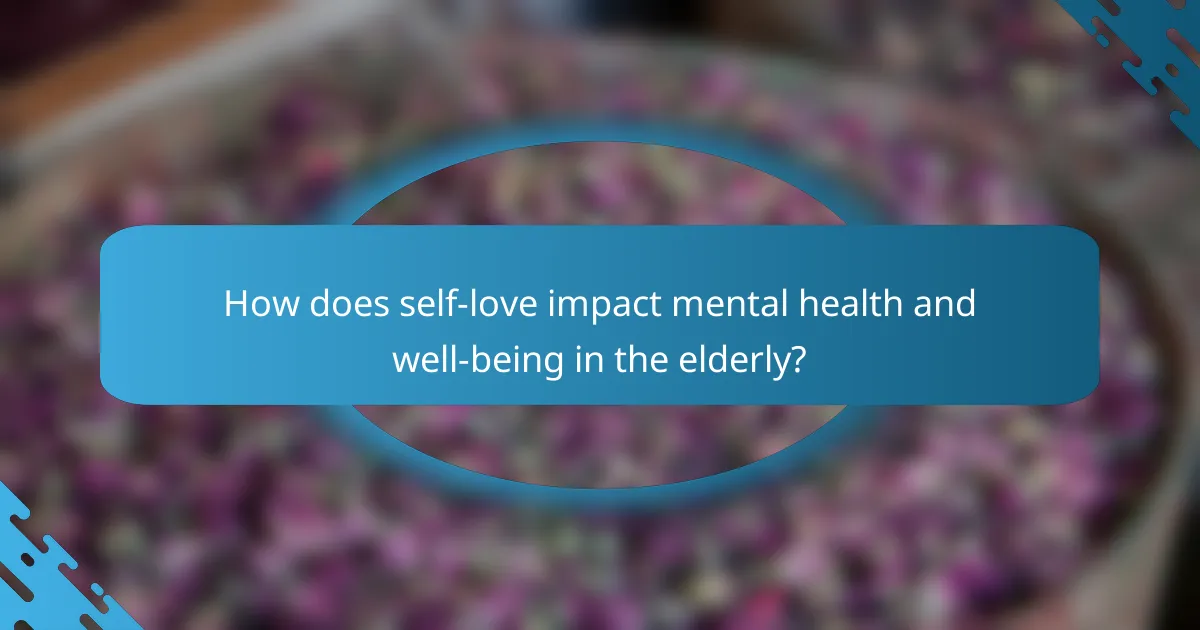
How does self-love impact mental health and well-being in the elderly?
Self-love significantly enhances mental health and well-being in the elderly by fostering resilience and reducing feelings of loneliness. It promotes positive self-perception, which leads to improved emotional stability. Studies indicate that elderly individuals practicing self-love report lower levels of depression and anxiety. Furthermore, self-love encourages social engagement, vital for combating isolation, thereby enhancing overall quality of life. Prioritising self-care routines can cultivate a sense of purpose and fulfilment, contributing to better mental health outcomes.
What are the key components of self-love for seniors?
Self-love for seniors includes self-acceptance, social connections, and self-care practices. These components foster mental health and enhance overall well-being.
Self-acceptance allows seniors to embrace their life experiences and acknowledge their worth. Social connections combat loneliness, providing emotional support and enhancing happiness. Self-care practices, such as regular exercise and healthy eating, improve physical health and boost self-esteem.
By focusing on these key components, seniors can cultivate a positive self-image and improve their quality of life.
How can self-acceptance enhance emotional health?
Self-acceptance significantly enhances emotional health by fostering resilience and reducing anxiety. It encourages a positive self-image, which is crucial for mental well-being, particularly among the elderly. Acceptance of oneself leads to decreased feelings of inadequacy and promotes emotional stability. As a result, individuals experience improved relationships and greater overall life satisfaction. Embracing self-acceptance can also serve as a unique attribute that empowers elderly individuals to navigate life’s challenges more effectively.
What role does self-compassion play in reducing anxiety?
Self-compassion significantly reduces anxiety by fostering a supportive inner dialogue and promoting emotional resilience. It encourages individuals to treat themselves with kindness during difficult moments, leading to lower stress levels. Research indicates that self-compassion practices can improve mental well-being among the elderly, enhancing coping mechanisms and reducing feelings of isolation. By cultivating self-compassion, older adults can develop a more positive self-image, ultimately leading to decreased anxiety and improved overall mental health.
What are the universal benefits of practicing self-love?
Practicing self-love offers universal benefits that enhance mental health and well-being for the elderly. These benefits include improved self-esteem, reduced anxiety, and greater resilience against stress. Engaging in self-love fosters a positive self-image, empowering individuals to embrace their unique attributes. As a result, elderly individuals often experience enhanced emotional stability and a deeper sense of fulfilment in their daily lives.
How can self-love improve social connections?
Self-love significantly enhances social connections by fostering confidence and empathy. When individuals prioritise their well-being, they cultivate a positive self-image, which attracts others. This empowerment encourages open communication and deeper relationships. Studies show that self-compassion leads to greater social support, reducing feelings of loneliness. As a result, the elderly can experience improved mental health and stronger community ties through self-love practices.
What effects does self-love have on physical health?
Self-love significantly enhances physical health by reducing stress and promoting overall well-being. Higher self-esteem correlates with healthier lifestyle choices, such as regular exercise and balanced nutrition. Research shows that individuals who practice self-love experience lower blood pressure and improved immune function. Additionally, self-compassion can lead to better recovery from illness, highlighting its unique attribute in fostering resilience.
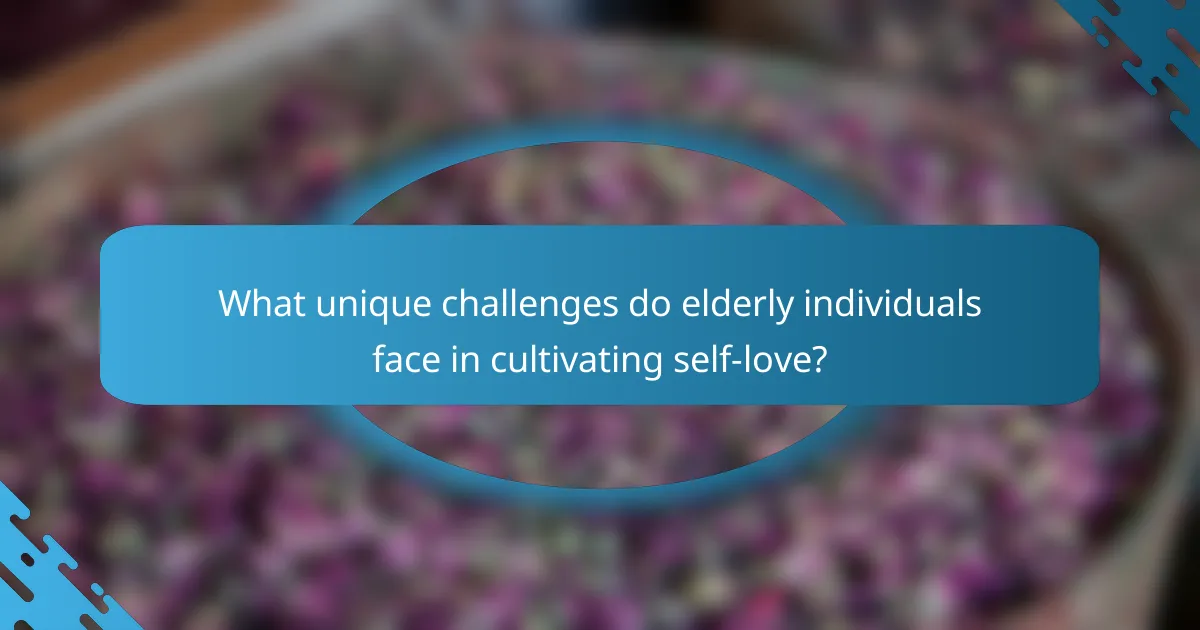
What unique challenges do elderly individuals face in cultivating self-love?
Elderly individuals face unique challenges in cultivating self-love, including societal ageism and declining physical health. These factors can lead to feelings of worthlessness and isolation. Many elderly people struggle with self-acceptance due to negative self-perceptions shaped by external judgments. Additionally, loss of independence and social connections further complicate their mental well-being. Addressing these challenges requires tailored support and interventions that foster a positive self-image and emotional resilience.
How do societal perceptions affect self-esteem in seniors?
Societal perceptions significantly impact self-esteem in seniors by influencing their sense of worth and belonging. Negative stereotypes about aging can lead to feelings of invisibility and inadequacy. Research indicates that seniors who perceive society as valuing youth may experience lower self-esteem, affecting their mental health and well-being. Encouraging positive narratives around aging can enhance their self-image and foster resilience.
What unique emotional hurdles must seniors overcome?
Seniors must overcome emotional hurdles such as loss of independence, social isolation, and fear of mortality. These challenges can lead to feelings of loneliness and depression. Addressing these issues through community engagement and mental health support is crucial for enhancing their overall well-being. Emotional resilience can be developed through practices like self-love, fostering a positive self-image, and building strong social connections.
How can loss and grief impact self-love?
Loss and grief can significantly diminish self-love by creating feelings of unworthiness and isolation. Experiencing loss often leads to emotional turmoil, which can hinder the ability to appreciate oneself. This impact can be particularly pronounced in the elderly, who may already struggle with self-esteem due to age-related changes. As a result, fostering self-love becomes crucial for mental health and well-being in this demographic. Engaging in supportive communities and seeking professional help can aid in rebuilding self-worth amidst grief.
What strategies can help combat feelings of isolation?
Engaging in social activities, practicing mindfulness, and maintaining a routine can effectively combat feelings of isolation. Connecting with community resources, such as senior centres or support groups, encourages interaction. Volunteering offers purpose and builds relationships. Regularly reaching out to family and friends fosters connection and emotional support.
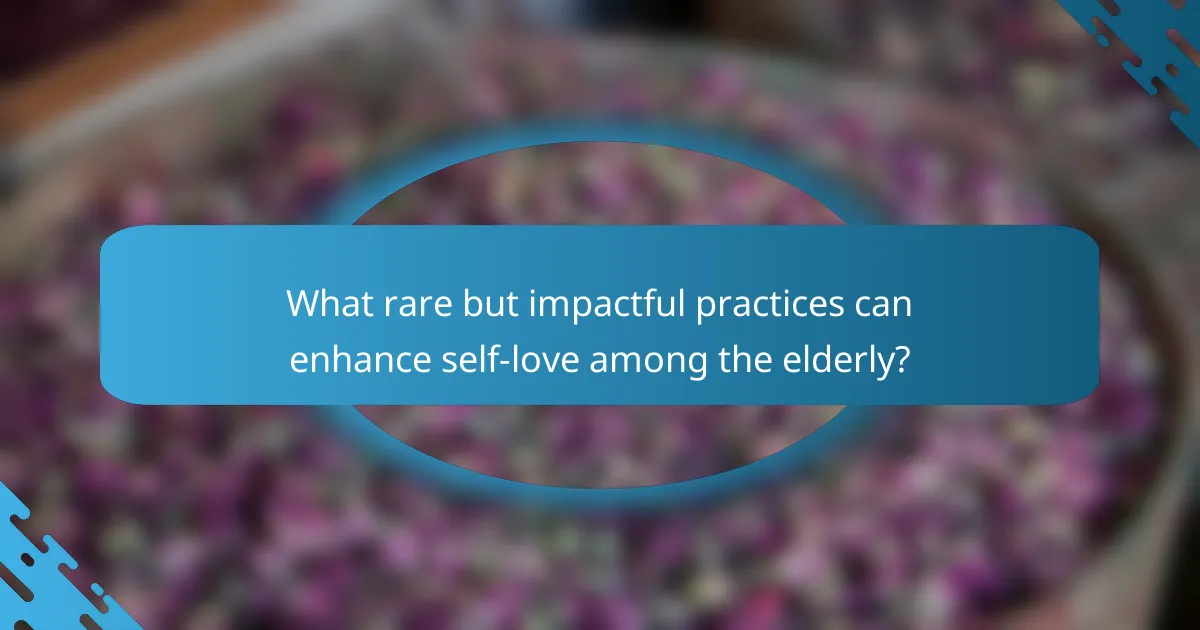
What rare but impactful practices can enhance self-love among the elderly?
Practices like storytelling, art therapy, and gratitude journaling can significantly enhance self-love among the elderly. Storytelling fosters connection and reflection, allowing individuals to share experiences and wisdom, which boosts self-esteem. Art therapy provides a creative outlet for expression, promoting emotional healing and self-acceptance. Gratitude journaling encourages a positive mindset by focusing on daily blessings, reinforcing self-worth. These rare practices create a supportive environment for mental well-being and self-love in older adults.
How can creative expression foster self-love?
Creative expression fosters self-love by enhancing self-awareness and promoting emotional healing. Engaging in art, writing, or music allows the elderly to explore their feelings and experiences, leading to improved mental health. Studies show that creative activities can reduce anxiety and depression, making self-love more attainable. Additionally, sharing creative work builds community connections, reinforcing a sense of belonging and self-worth.
What types of art therapy are most effective for seniors?
Art therapy types effective for seniors include reminiscence therapy, guided imagery, and expressive arts. These approaches foster emotional expression and cognitive engagement.
Reminiscence therapy encourages seniors to share past experiences, enhancing social interaction and memory recall. Guided imagery utilises visualization techniques to promote relaxation and reduce anxiety. Expressive arts, such as painting or music, provide creative outlets, improving mood and self-esteem.
Research indicates that these therapies can significantly improve mental health and overall well-being among the elderly, leading to greater life satisfaction.
What role does mentorship play in promoting self-love?
Mentorship plays a crucial role in promoting self-love by providing guidance and support. It fosters self-acceptance through positive reinforcement and constructive feedback. Mentors help individuals recognise their strengths, enhancing self-esteem and encouraging a healthier self-image. Additionally, mentorship creates a safe space for sharing experiences, which can lead to deeper self-reflection and personal growth. Ultimately, this relationship empowers the elderly to embrace their identities, reinforcing the art of self-love.
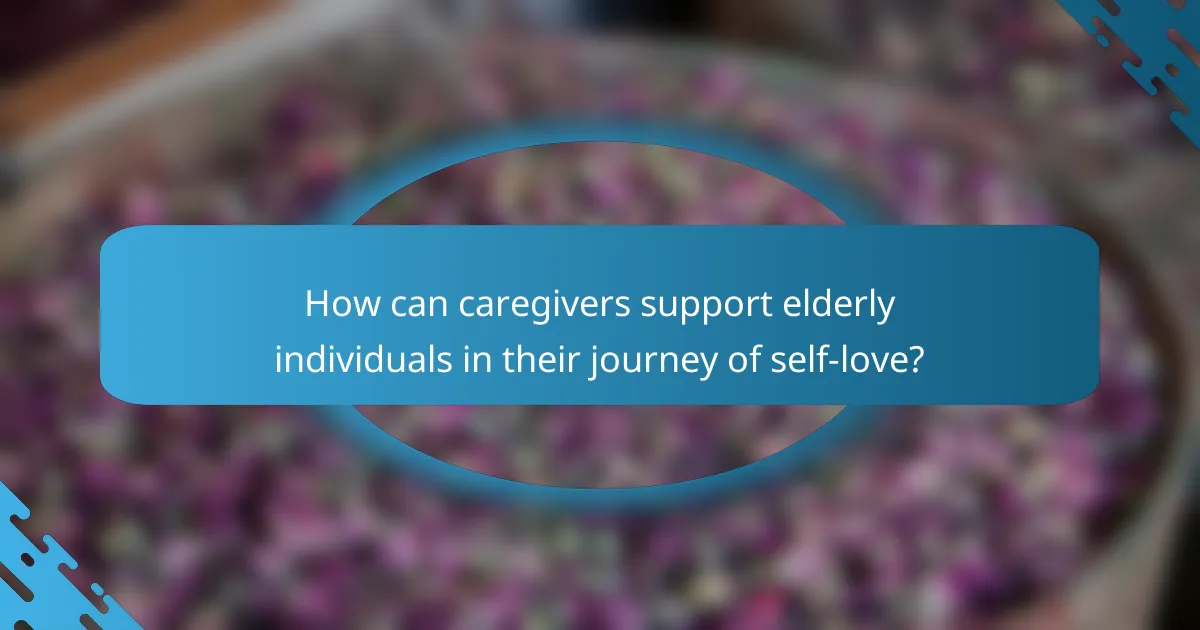
How can caregivers support elderly individuals in their journey of self-love?
Caregivers can support elderly individuals in their journey of self-love by fostering an environment of acceptance and encouragement. They should actively listen to the emotional needs of the elderly, validating their feelings and experiences. Engaging in meaningful activities together can enhance self-worth and promote positive mental health. Regularly encouraging self-reflection through journaling or discussions can help seniors recognise their own value. Additionally, caregivers can facilitate social connections, as relationships significantly contribute to a sense of belonging and self-love.
What best practices should caregivers adopt?
Caregivers should prioritise self-care, establish boundaries, and seek support. These practices enhance their mental health and well-being, ultimately benefiting the elderly they care for. Regular breaks can prevent burnout and maintain emotional balance. Engaging in activities that promote relaxation and joy is essential. Additionally, continuous education on elderly care fosters confidence and competence.
How can caregivers encourage positive self-talk?
Caregivers can encourage positive self-talk by modelling affirmations and creating a supportive environment. Engaging in regular conversations about feelings helps seniors articulate their thoughts. Encourage journaling to foster self-reflection and promote mindfulness practices to enhance mental well-being. Additionally, providing positive reinforcement for accomplishments, no matter how small, builds confidence and self-esteem.
What activities can caregivers facilitate to promote self-love?
Caregivers can facilitate activities like journaling, art therapy, and mindfulness exercises to promote self-love. These activities foster emotional expression and self-reflection, enhancing mental health and well-being. Engaging in group discussions can also build community and support among the elderly, reinforcing their sense of worth. Regularly scheduled activities encourage consistency, helping to establish a routine that nurtures self-acceptance and positive self-regard.
What common mistakes should caregivers avoid?
Caregivers should avoid neglecting their own self-care, overcommitting, and failing to communicate effectively. Prioritising personal well-being is crucial for sustaining the mental health of both caregivers and the elderly they support. Common mistakes include ignoring signs of burnout, which can impair caregiving quality, and not setting boundaries, leading to emotional strain. Additionally, caregivers often overlook the importance of seeking support from peers or professionals, which can enhance resilience and coping strategies.
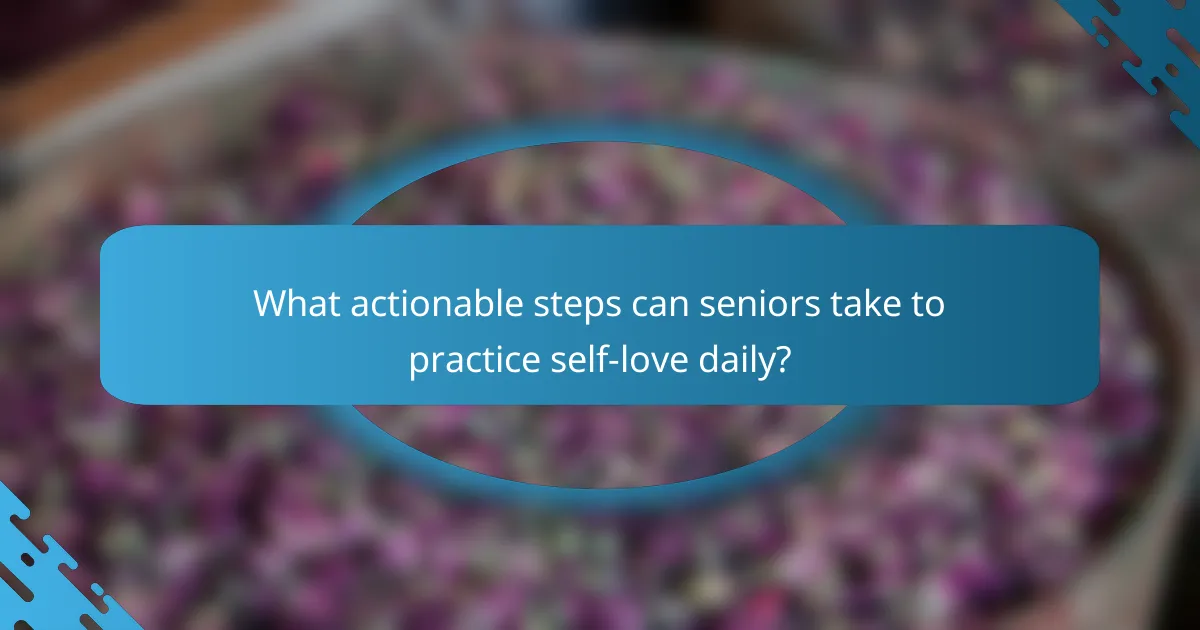
What actionable steps can seniors take to practice self-love daily?
Seniors can practice self-love daily by engaging in simple, meaningful activities that enhance their mental health. Prioritise self-care routines, such as daily meditation or journaling, to foster self-reflection and gratitude. Establish a consistent exercise regimen, even light activities, to boost mood and physical well-being. Connect with friends or family regularly, as social interactions are vital for emotional support. Lastly, explore hobbies or interests to nurture creativity and joy. These steps collectively empower seniors to cultivate a positive self-image and improve overall well-being.
How can journaling enhance self-reflection and self-love?
Journaling enhances self-reflection and self-love by providing a structured outlet for thoughts and emotions. It encourages the elderly to articulate feelings, fostering deeper self-awareness. Regular journaling can reveal patterns in thoughts, leading to insights that promote acceptance and compassion towards oneself. Additionally, expressing gratitude in journals can significantly boost self-esteem and emotional well-being. Research shows that writing about positive experiences enhances overall mental health, making journaling a valuable tool for self-love and reflection.
What mindfulness techniques are beneficial for self-love?
Mindfulness techniques that enhance self-love include meditation, breathing exercises, and body scans. These practices foster self-awareness, reduce negative self-talk, and promote emotional well-being. Regular meditation can increase feelings of compassion towards oneself, while breathing exercises help manage stress. Body scans encourage a deeper connection with one’s physical self, aiding acceptance and appreciation. Incorporating these techniques into daily routines can significantly improve mental health for the elderly.
How can seniors set achievable self-care goals?
Seniors can set achievable self-care goals by starting small and focusing on specific, measurable actions. Begin with daily routines that enhance mental health, such as a 10-minute walk or reading for pleasure.
Establishing a support system can also be beneficial. Engaging with friends or family for regular check-ins encourages accountability. As a result, social interactions can improve emotional well-being.
Tracking progress is essential. Use a journal or app to document achievements, which can motivate further goal setting. Celebrating small milestones reinforces positive behaviour and fosters a sense of accomplishment.
Incorporating mindfulness practices, like meditation or deep breathing, can enhance self-awareness and reduce stress. These techniques contribute to a holistic approach to mental health and well-being for seniors.
What resources are available for seniors seeking to improve their self-love?
Seniors can access various resources to enhance self-love, including support groups, workshops, and online courses. Community centres often offer programmes focused on mental health and well-being. Additionally, therapy sessions with licensed professionals provide personalised guidance. Mindfulness and meditation apps are also beneficial, promoting self-acceptance and emotional resilience. Local libraries may host events or provide materials on self-care practices tailored for seniors.